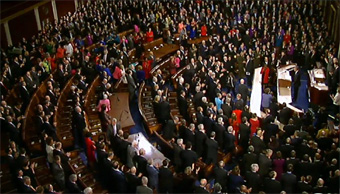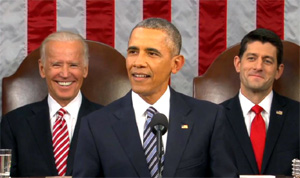
Images courtesy CBS News/C-Span
State of the Union:
Wild Applause Versus Poker Faces
| published January 13, 2016 |
By R. Alan Clanton, Thursday Review editor
Advance spin regarding President Barack Obama’s 2016 State of the Union, the last he will deliver as U.S. president, suggested strongly that the speech would contain his vision for the future—a forward-looking discussion of broad stroke topics, and a grand non-partisan elegy to burnish his legacy. The speech, we were told, would look forward, not backward.
Judging from the poker face of newly elected Speaker of the House Paul Ryan, which for the vast majority of the President’s speech remained fixed with a tight, understated smile, Republicans thought the State of the Union address was unvarnished partisan politics, complete with heavy handed slaps at GOP legislators, prickly insults, and jokes at the expense of anyone in opposition to the White House.
To judge from Democrats in the room, including Vice-President Joe Biden sitting directly behind Obama, the President’s speech was a soaring and glowing assessment of the previous seven years: a steadily improving economy, lower gasoline prices, jobs growth, a safer world, terrorism contained, a comprehensive health care system within reach of all, and the removal of Osama bin Laden from the world stage.
Democrats cheered wildly; Republicans sat on their hands. Few in that room could be said to have responded in purely neutral terms. Scant were the occasions when there was simultaneous applause from both sides of the political aisle.
The speech, somewhat shorter than Obama’s previous State of the Union addresses, even included some not-so-thinly-disguised broadsides aimed at some within the current crop of Republican presidential contenders, including businessman Donald Trump, the national polling leader among GOP voters, and Texas Senator Ted Cruz, currently leading Trump in the all-important early caucus state of Iowa, which holds its contest in a matter of weeks. Though Obama never mentioned the names of Cruz or Trump or any other Republican candidate, his references were clear and unmistakable.
Referring to the dominance of the Islamic State in parts of Syria and Iraq, and to the masses of people fleeing war-torn areas of both countries, Obama called out Trump, Cruz and other GOP candidates for what he clearly thinks is rhetorical overreach and pandering to fear. Obama said there may be instability in the Middle East and places in Asia for many years to come.
“Some of these places may become safe havens for terrorist networks,” Obama said, “others will fall victim to ethnic conflict…or famine…thus feeding the next wave of refugees. The world will look to us to help solve these problems, and our answer needs to be more than tough talk, or calls to carpet bomb civilians. That may work as a TV sound bite, but it does not pass muster on the world stage.”
Obama also challenged those GOP candidates—specifically Trump, though he did not mention the billionaire’s name—who have questioned the presence of Muslims in the United States.
“When politicians insult Muslims, when a mosque is vandalized, or a kid bullied, that doesn’t make us safer,” Obama said. “That’s not ‘telling it like it is.’ It’s just wrong. It diminishes us in the eyes of the world. It makes us harder to achieve our goals. And it betrays who we are as a country.” The comments were seen as a retort to Trump’s often bellicose language regarding Islam, and the candidate’s proposal to limit or restrict the number of Muslim’s entering the U.S.
Taking still one more shot at Trump, the President needled the billionaire’s campaign slogan “Make America Great Again.” In campaign speeches and in media appearances, Trump often recites factors which he believes show that the U.S. is receding in prestige and power and influence. Obama’s retort was short and abrupt.
“The United States of America is the most powerful nation on Earth, period,” the President said.
Later, taking a dig at New Jersey Governor Chris Christie’s recent comment that the United States is already engaged in a world war in its wide battles against ISIS and other militant and terror armies, Obama said such talk is counterproductive and dangerous, and declared that “…over-the-top claims that this is World War III just play into [Islamic State] hands.”
But Republicans were having none of it. Reaction to the speech was swift and uniform. Aside from Trump, who called the speech “boring, slow and lethargic,” many Republicans suggested flatly that Obama was both foolish and naïve in his assessments of ISIS, al Qaeda and other terrorist groups—all now expanding their reach into scores of countries on nearly every continent.
Ted Cruz for his part ripped into the President for not even acknowledging the foreign policy crises unfolding in real time that very day, including terrorist attacks in several cities in Turkey and Egypt, and the detaining of American seamen by the Iranian Revolutionary Guard.
“The fact that this [the Iranian incident] happened in the first place,” Cruz told reporters with NBC, “is a direct consequence of the weakness of the Obama-Clinton foreign policy.”
Former Arkansas Governor Mike Huckabee said that the speech was all “glows and grins” and lacking in substance or reality. Huckabee said of Obama’s speech that he “pats himself on the back” repeatedly.
In a short video released by Rand Paul, the Kentucky Senator chided Obama for missing the mark. 
“What we saw,” Paul said, “was a leader with a record of failure in search of any meaningful positive legacy.”
That there were sharp disagreements over the substance and style and veracity of the President’s speech should come as little surprise. With only a few weeks to go before the Iowa caucuses, the stakes have become very high for candidates in both parties, but most especially for Republicans as they battle for every vote in what has been a wildly unpredictable nomination fight.
With Cruz leading in Iowa, but with Trump leading the pack in most national polls, the real struggle now appears to be an intense fight for a solid third or fourth place in Iowa, and hand-to-hand combat in the New Hampshire, South Carolina and Nevada—the next states to hold primary contests. Rubio and Cruz are in a nip-and-tuck struggle for second place, while Christie, Bush, Kasich and Carson fight for the allegiance of every remaining vote.
Republicans will conduct their next debate this week in South Carolina. Rand Paul was booted from eligibility this week by Fox News when the network said he did not meet the polling criteria mandated to appear on the stage during the prime time debate. Paul was invited instead to appear in the undercard contest, several hours before the start of the forum between the top tier candidates.
During the President’s speech he also called for a national effort to cure cancer—what he called a Cancer “moonshot”—and announced that he had appointed Vice-President Joe Biden with the task of coordinating the initiative.
Related Thursday Review articles:
Rand Paul, Carly Fiorina Demoted to Undercard Debate by Fox News; R. Alan Clanton; Thursday Review; January 12, 2016.
Rubio Wins in PPP Matchup With Clinton; Keith H. Roberts; Thursday Review; December 26, 2015.
